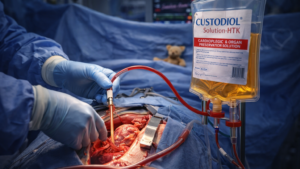Objectives: To explore trends in intraoperative procoagulant factor concentrate use in patients undergoing heart transplantation (HTx) in Virginia. Secondarily, to evaluate their association with postoperative thrombosis.
Design: Patients who underwent HTx were identified using a statewide database. Trends in off-label recombinant activated factor VII (rFVIIa) use and on-label and off-label prothrombin complex concentrate (PCC) use were tested using the Mantel-Haenszel test. Multivariate logistic regression was used to test for an association between procoagulant factor concentrate administration and thrombosis.
Setting: Virginia hospitals performing HTx.
Participants: Adults undergoing HTx between 2012 and 2022.
Interventions: None.
Measurements and main results: Among 899 patients who required HTx, 100 (11.1%) received off-label rFVIIa, 69 (7.7%) received on-label PCC, and 80 (8.9%) received off-label PCC. There was a downward trend in the use of rFVIIa over the 10-year period (p = 0.04). There was no trend in on-label PCC use (p = 0.12); however, there was an increase in off-label PCC use (p < 0.001). Patients who received rFVIIa were transfused more and had longer cardiopulmonary bypass time (p < 0.001). Receipt of rFVIIa was associated with increased thrombotic risk (odds ratio [OR] 1.92; 95% CI 1.12-3.29; p = 0.02), whereas on-label and off-label PCC use had no association with thrombosis (OR 0.98, 95% CI 0.49-1.96, p = 0.96 for on-label use; and OR 0.61, 95% CI 0.29-1.30, p = 0.20 for off-label use).
Conclusions: Use of rFVIIa in HTx decreased over the past decade, whereas off-label PCC use increased. Receipt of rFVIIa was associated with thrombosis; however, patients who received rFVIIa were more severely ill, and risk adjustment may have been incomplete.
Keywords: bleeding; coagulation; heart transplant; thrombosis.







